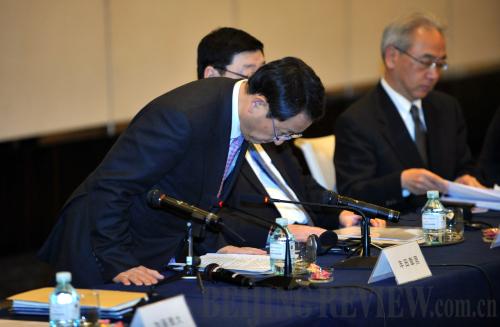|
Think twice
 |
|
APOLOGY IN BEIJING: Akio Toyoda, President and CEO of Toyota, bows at a press conference held in Beijing on March 1 to apologize to Chinese consumers from Toyota's recall (ZHANG KE) |
Despite seven Toyota recalls due to various product defects since 2008, there were no strong protests or massive media coverage among Chinese consumers or news outlets. Unlike litigious American consumers, those in the Chinese market took the Toyota quality problems silently, except for a little ink about the auto giant's global woes.
"I don't think Chinese consumers will hit the company when it's down," said Mei Xinyu, a researcher at the Chinese Academy of International Trade and Economic Cooperation under the Ministry of Commerce on his blog. Mei said the fuss from the United States was political in nature.
Mei said when making innovations, some problems cannot be detected in the lab and will only emerge after large-scale application. The purpose of a recall is not to provide the utmost compensation for consumers, but to warn automakers of underlying risks so that the whole industry can make breakthroughs after the problem is resolved.
But the lack of public outcry or media attention does not mean the Chinese market is more tolerant. Chinese car buyers are voicing their opinion in other ways. Toyota fell out of the top 10 car brand list in January this year in the aftermath of the U.S. recall. Its best-selling vehicles—Corolla and Camry—were also absent from the list. According to figures from the China Association of Automobile Manufacturers (CAAM), the two models sold 157,500 and 156,200 units respectively in 2009 in China, ranking ninth and 10th on the top 10 list.
Analysts said Toyota's January sales setback was just the tip of the iceberg as the gas pedal problem was not completely revealed to domestic consumers and matters will only become more overwhelming.
"Toyota might have to face ugly sales figures in February," said Shao Lin, a researcher in the automobile field of Bohai Securities Co. Ltd.
In January 2010, domestic car sales rose 12.9 percent compared with December 2009, said CAAM. In spite of the vigorous car demand in the country, Toyota's sales in China dipped 16.28 percent in January month on month, The Beijing News quoted a Toyota insider as saying.
Shao said although Toyota's president tried to convince Chinese consumers that cars sold in China were safe, the American accidents had already cast a shadow over Toyota's reliability. A video clip of the crash of a Lexus, claiming the lives of an American family, due to sudden acceleration was widespread among Chinese Internet users.
Beijing Review talked to a number of potential car buyers at a few auto dealerships in Beijing. Most had heard of the Toyota problem and said they would think twice when asked if they would buy a Toyota.
"Unless the company makes sure there will be no fatal quality problems and offer attractive product guarantee packages, I will not consider buying it," said prospective car buyer Xiao Yi.
In the United States, Toyota has created a quality car making image for itself—one many American consumers have bought into. But in China, drivers have different views.
"I never think of Toyota as a high-quality brand," said Wang Bing, a visitor to a car dealership in Beijing. "As far as I know, Japanese sedans are well known for their fuel efficiency and smart exterior design, but never quality."
A blessing or warning?
Toyota's loss is its competitors' gain—to some extent.
The Toyota recall warned domestic automakers to attach more importance to quality, safety and consumers, said Luo Lei, Deputy Secretary General of the China Automobile Dealers Association, in an interview with Xinhua News Agency.
In some domestic Toyota dealerships, salespeople have spared no efforts in enticing potential Toyota consumers by offering zero-interest loans or promoting new Toyota models. But no salespeople would dare reassure customers that their cars do not have problems at all.
Zhang Xiaoyu, Honorary Chairman of CAAM, said domestic manufacturers should not gloat over Toyota's misfortune, but instead they must draw lessons from the Japanese company.
Zhang said it could happen to any company and any product, either in terms of technology or in the process of manufacturing. "If the company can properly handle consumer complaints and remedy the situation, it can restore consumer confidence and show the responsible manner of the company," Zhang said in an interview with Auto.sohu.com. | 